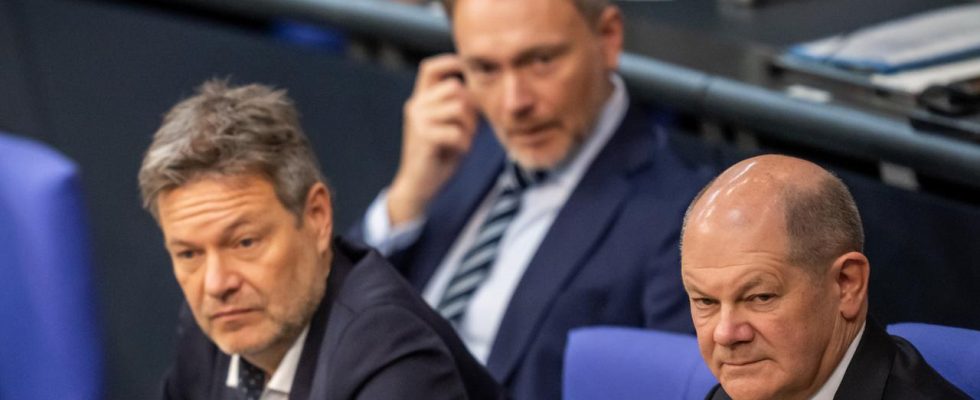faq
Will the government manage to pass the 2024 budget this year? How will the billion dollar hole be filled? She has to clarify urgent questions; the coalition committee is meeting today. So far, no party wants to live up to the core promises.
How does the federal government want to solve the budget crisis? There are many answers to this, and sometimes very different ones within the government coalition. There is still open and heated debate about what consequences the government is drawing from the Karlsruhe judge’s ruling. This primarily affects the budget for the coming year as well as long-term investments worth billions in climate protection and the modernization of the economy. Coalition members warn that tens of thousands of jobs are at stake.
Today, leaders of the three traffic light parties are meeting with Chancellor Olaf Scholz (SPD). Will they determine what the federal government will spend less money on next year? Or are they just promising each other that they will continue to tackle the problems together? An overview.
Chip factories and Heating support: What remains of the KTF?
Since the Constitutional Court ruling, the federal government has been missing 60 billion euros from the Climate and Transformation Fund (KTF), which had already been earmarked for investments in the next four years. This should, among other things, finance billions in funding for Intel and TSMC chip factories, funding for the replacement of old oil and gas heating systems, the renovation of the railway, charging infrastructure for electric cars and many other projects. Legally binding funds can flow in 2024 even without the 60 billion because the fund has its own income and enough money.
One thing is also certain: heating subsidies should not be cut for the time being. But what about the rest? The projects affect the “economic core of Germany,” warns Economics Minister Robert Habeck (Greens). The Union proposes to reverse the heating subsidy. One possibility would also be to generate more revenue through tax increases – which the FDP categorically rejects.
How to fill the billion dollar hole in the 2024 budget?
The ruling not only affects the climate fund, it has also indirectly torn a billion-dollar hole in the budget for 2024. In total, the coalition will probably have to scrape together just under 20 billion euros. This is mainly because the federal government has to dissolve the special pot for state energy price controls, the Economic Stabilization Fund (WSF).
Interest payments from this will now be added to the core budget, as will aid for flood victims, which was previously paid from a special fund. In addition, the government will have to dig deeper into the reserves it built up during the refugee crisis this year. These billions will also be missing in 2024.
The WSF dissolution has concrete consequences for consumers: the energy price brakes expire at the end of the year and not at the end of March as planned. Even though prices have now fallen significantly, the federal government described the extension of the brakes as insurance against unexpected risks.
Citizens could also face higher electricity prices for another reason: the federal government had actually planned a subsidy of up to 5.5 billion euros towards network fees. The problem: This grant should be financed from the WSF. Does the money now come from the core budget? Scholz has announced that he will set priorities and “of course also limit spending”. But what should be eliminated is an open question.
The Union, on the other hand, already has a strike list. On it: citizen’s benefit, basic child security, social benefits. The SPD and the Greens reject this. The Greens, on the other hand, want to get subsidies that they believe are harmful to the climate, such as tax breaks for company cars.
What happens next with the debt brake?
Immediately after the Karlsruhe ruling, a debate broke out about the future of the debt brake. Many SPD and Green politicians are calling for a reform so that the state can take out more loans for important investments. Then future projects would no longer be in jeopardy. Economists also think this makes sense, and even individual CDU prime ministers were open.
However, the FDP has so far insisted that the regulation in the Basic Law will not be affected. CDU leader Friedrich Merz sees it the same way.
Is the traffic light running out of time?
The traffic light coalition must decide when the budget for 2024 should be decided. This year – which would be usual – there isn’t much time left. The Federal Council only meets regularly on December 15th. The SPD parliamentary group in particular is pushing for a quick decision. The background is that funding cuts for social organizations and other groups should be reversed with the budget resolution – without a resolution, these organizations may have to lay off employees at the turn of the year, warned SPD parliamentary group leader Rolf Mützenich.
Exactly what happens next may become clear after the budget committee meeting scheduled for this afternoon. But one thing is clear: If there is no federal budget at the beginning of the year, the so-called provisional budget management takes effect. Then, for the time being, only expenses that are necessary to maintain administration and fulfill legal obligations are possible. In practice, however, the Ministry of Finance can authorize ministries to use a percentage of the funds in the not yet approved draft budget each month.
(Source: dpa)

